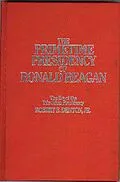Beginning in the 1970s, the public has turned to the media for information and guidance in selecting their presidents. Television has become the primary means of getting to know the issues and candidates. This monograph examines the mediazation of the U.S. presidency, as exemplified by President Reagan's role as the great communicator. Specifically, Denton analyzes the use of television as an instrument of image-making and governing, the role of the media in contemporary politics, the impact of television on presidential politics, and the future of the presidency in the age of television. Scholars of communications studies, political science, and American politics will welcome this critical analysis of the primetime presidency.
Autorentext
Robert E. Denton Jr. holds the W. Thomas Rice Chair of Leadership Studies in the Pamplin College of Business and is Professor in the Department of Communication at Virginia Tech, USA. He has degrees in political science and communication from Wake Forest University and Purdue University. In addition to numerous articles, essays, and book chapters, he is author, coauthor, or editor of thirty books, several in multiple editions.
